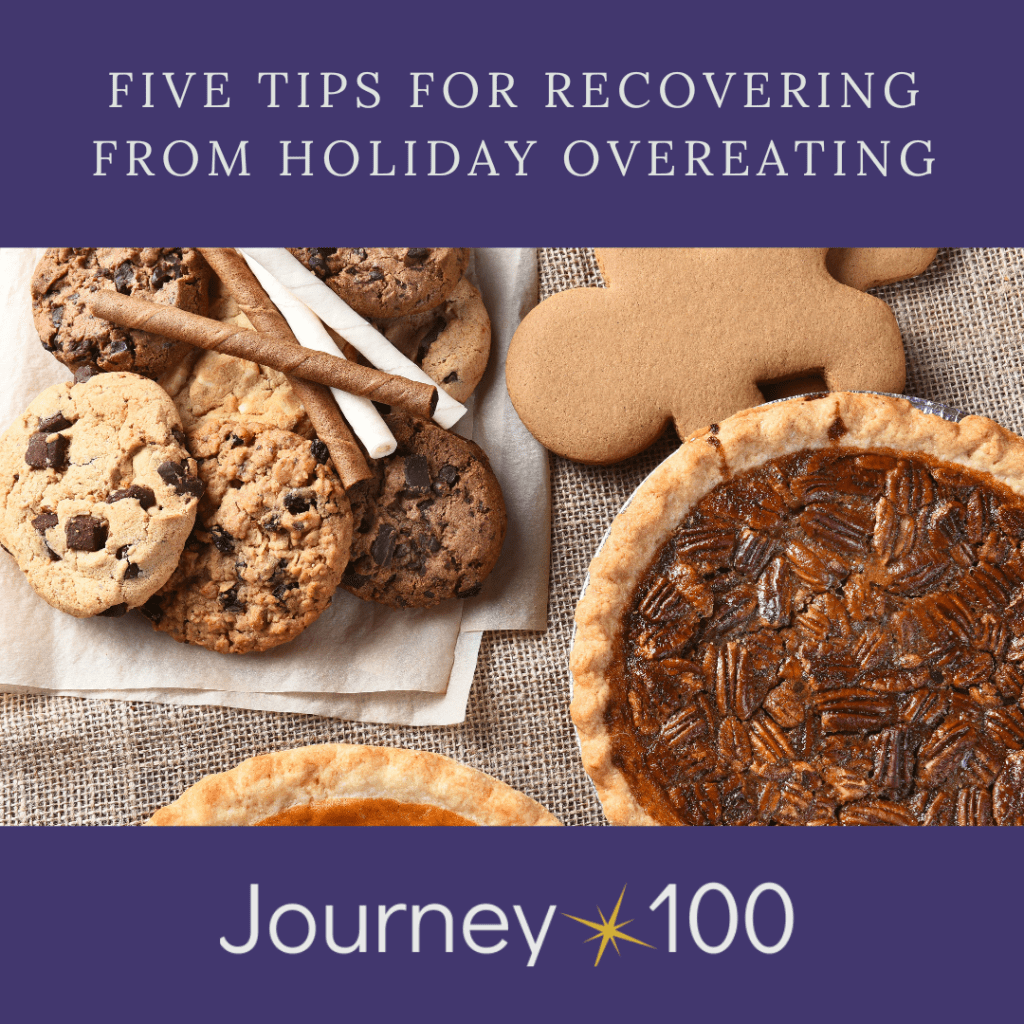Five Tips for Recovering from Holiday Overeating

The holiday season is marked by good times with family and friends plus delicious, holiday treats. If you have been overeating these holiday treats, then these five tips on recovering from holiday overeating are for you! 1. Hydrate, Hydrate, Hydrate: After indulging in holiday goodies, prioritize hydration. Water is your body’s best friend when it comes to flushing out toxins and aiding digestion. If you overindulged in alcoholic drinks then you are likely dehydrated and in need of hydration. Grab your trusty water bottle and make it your sidekick throughout the day. Not only will it help detoxify your system, but it can also curb those lingering sugar cravings. 2. Reconnect with Nutrient-Rich Meals: Reset your system with nutrient-packed meals. Think fresh veggies, lean proteins, and whole grains. These foods provide the essential nutrients your body craves, helping stabilize your energy levels and getting you back on track. I love using this technique as a way to focus on what TO eat rather than restricting other foods. This way you focus on nutrients and naturally crowd out room on your plate for other, less nutritious foods. 3. Move Your Body in a Way You Enjoy: Banish guilt and embrace movement that brings you joy. Whether it’s a brisk walk, a dance session in your living room, or a calming yoga class, find an activity that feels good for you. Physical activity not only burns those extra calories but also boosts your mood, helping you regain that post-holiday feel good vibes. 4. Plan Your Meals and Snacks: Creating a plan can be a game-changer. Outline your meals and snacks for the day to avoid impulsive choices. Planning ahead helps you make mindful and balanced food decisions, ensuring you nourish your body without feeling deprived. 5. Practice Mindful Eating: Savor each bite and be present during meals. I like to practice mindful eating by always sitting at a table to eat, limit conversations and make sure my phone (or TV) are not in sight. Mindful eating allows you to recognize true hunger and fullness cues, preventing overeating. Put away distractions, engage your senses, and relish your food consciously. Remember, we’re all human, and a little indulgence during the holidays is perfectly normal. It’s the actions we take afterward that truly matter. Treat yourself with kindness and use these simple tips to guide you back to feeling your best. Here’s to a healthy and vibrant start to the year ahead! Your Coach, Andrea
How Sleep Helps with Weight Loss

For many busy women, we find that extra time in our day to workout or meal prep by getting up earlier or staying up later. But are we actually doing ourselves a favor when it comes at the cost of our sleep? In this blog post, I will uncover for you how sleep helps with weight loss. Why Sleep Matters Metabolic Magic: Your body regulates hormones that control hunger and fullness while you sleep at night. Inadequate sleep disrupts this delicate balance, leading to increased appetite and cravings for high-calorie, sugary foods. Energy Drain: Ever notice how sluggish you feel after a restless night of sleep? Sleep deprivation zaps your energy levels, making it challenging to stay active and motivated to exercise. You are also more likely to crave those foods that give you quick bursts of energy (i.e. simple carbs and sugary foods) but don’t offer much nutritional value. Stress Sabotage: Lack of sleep can trigger stress hormones like cortisol, which not only make you feel anxious but can also lead to fat storage, especially around the belly area. How to Improve Your Sleep Habits and Your Weight Loss Now that we’ve established how sleep helps with weight loss, let’s talk about some practical steps you can take to ensure you’re getting the sleep you need. 1. Set a Sleep Schedule: More than likely, you have a routine during the workweek but it’s also important to aim for consistency on weekends too. Try to go to bed and wake up at the same time each day, even on weekends. This routine in your sleep patterns helps you fall asleep faster and wake up more refreshed as your circadian rhythm remains consistent. 2. Create a Relaxing Bedtime Routine: Wind down before bed with calming activities like reading, gentle stretching, or a warm bath. These rituals signal to your body that it’s time to get ready for sleep. I enjoy reading fiction before bed as a way to get out of my own head and get enveloped in another storyline. It helps to detach from my perceived problems or to-dos. 3. Limit Screen Time: The blue light emitted by phones, tablets, and TVs can interfere with your body’s natural sleep-wake cycle. Try to avoid screens at least an hour before bedtime. This could be a great challenge to explore new hobbies such as Zentangles, knitting or yoga. 4. Cut the caffeine: Avoid caffeine too close to bedtime. This might take a little trial and error to find the cut-off time that’s right for you. I personally stop drinking caffeinated drinks at 5pm and have found that I go to sleep much easier now at my bedtime of 10:30pm. 5. Make Your Sleep Environment Cozy: Ensure your bedroom is conducive to sleep by keeping it dark, quiet, and cool. I set our thermostat to four degrees cooler than we keep it during the daytime as well as I use a ceiling fan at night for both cooling and white noise. I even ask Alexa to turn off her screen as we go to bed and put my phone face down to eliminate extra light. 6. Manage Stress: Practice relaxation techniques like deep breathing, meditation, or gentle yoga to calm your mind before bedtime. I like journaling in the evening to help take any racing thoughts and putting them down on paper. I often tell myself that my thoughts are now written down and I can come back to them tomorrow. Celebrating Your Progress Remember, the journey to better sleep habits is all about progress, not perfection. If you’ve struggled with sleep in the past, don’t be too hard on yourself. Celebrate the small wins along the way, like going to bed 15 minutes earlier or choosing to read rather than watch TV before bedtime. These victories are building blocks toward better sleep and achieving your weight loss goal. By prioritizing restful nights and making small changes to improve your sleep habits, you’ll be better equipped to achieve your weight loss goal with energy, focus, and a clearer mind. You’ve got this! Your Coach, Andrea
How to be a Cravings HERO

Cravings and urges for foods are a part of the human experience. But when you are trying to lose weight and urges for crave-worthy foods come up, this can cause problems for your weight loss. Below I’m going to teach you how to be a cravings hero instead of a weight loss zero. Acknowledge the craving When you have a craving, the first step to being a cravings hero is to acknowledge it. You can’t step up to be the hero until you know there is a problem. Acknowledging it isn’t hard. All you have to do is say to yourself “I’m having a craving for some chocolate” or “I’m having an urge to eat potato chips.” Acknowledging this thought it key to bringing your awareness to the situation. It helps you to start slowing down your thoughts and engaging your logical brain. There is nothing right or wrong about having a craving. It’s something that happens. Sometimes the simple act of acknowledging it and telling yourself this is normal is enough to take the pressure off. Change the scenery Yes, go somewhere else. You can make allowing a craving to pass much easier on yourself when you leave the area where you first felt that craving. Often our cravings happen in the kitchen. Take a three minute walk to the mailbox, go to your bedroom or any other part of the house. Changing the scenery gives you the time and space to consider how you want to react to that craving. It is difficult to think through your choice when the food item that triggered the craving is staring you in the face. Taking just a few minutes to go somewhere else gives you the opportunity to reset and think through how you want to respond. This is normal and temporary Often the biggest frustration about cravings is that we don’t think they should be happening. We want to pick a diet plan and stick to it perfectly without any bumps or hiccups. But that’s not real life. Bumps, hiccups and cravings are all a part of the game. You can take a lot of pressure and frustration off your weight loss journey by simply accepting that this a normal part of the process. After you remind yourself that cravings are normal, remind yourself that they are also temporary. They do not last forever. Cravings don’t just going away by giving into them. There have been many times where I have wanted some potato chips or chocolate and didn’t have any in the house. I was too lazy to go to the store and get them so I just went without it. And guess what? Eventually I stopped thinking about it and moved on. The craving went away. You’re in control Whether it feels like or not, you are always in control. If you decide to eat the food or not, you did so because you decided to. This is a beautiful thing. It’s not the delicious looking slice of cake that made you eat it. It wasn’t the bag of popcorn that moved your hand up to your mouth. You always get to decide and take action. There is no right decision either. You can decide to eat it, decide to plan for it another time or decide not to eat it at all. Those choices are available to you. Consider your weight loss goal and how each decision will affect it. As long as you like your reasons then go for it! On my weight loss journey, no foods were off limits but I made a food plan each day and if the craving food wasn’t on the plan, I didn’t eat it. I would choose to write my craving food on my plan for the next day as a way to keep my promise to myself that day but also acknowledge that if I wanted something and I could truly have it when it was planned for. Celebrate it Eating food is a pleasurable activity. When we say no to cravings because we “shouldn’t” it can feel like punishment or restriction, which is not pleasurable at all. If you decide to eat the food but followed the process above, that’s something to celebrate! If you decided to plan for the craving food for another time and delay gratification to be more intentional in your choice, another great celebration. If you decided not to eat the food now or later, wonderful! In any of these situations, you are becoming more aware and intentional in your choices and that is something to celebrate! Your coach, Andrea
